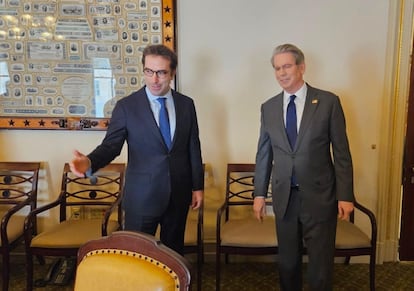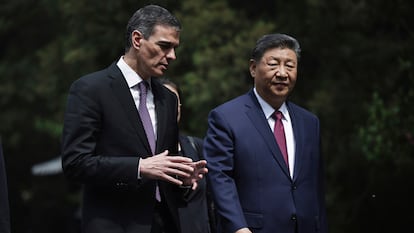Washington asks Spain to increase defense spending and axe ‘Google tax’ after meeting with economy minister
Treasury Secretary Scott Bessent dispensed with the polite expressions about ‘common interests’ commonly used in official statements. The meeting comes shortly after Spanish PM Pedro Sánchez met with Xi Jinping in Beijing


“Common interests.” “Joint priorities.” “Shared prosperity.” “Strong ties.” “Importance of the relationship.” These seemingly empty phrases, common in the summaries of the meetings held so far by U.S. Treasury Secretary Scott Bessent with his counterparts from other countries, attract more attention when they disappear. And they are conspicuously absent from the harsh and cold summary statement of the meeting that Bessent held in Washington with Spain’s Economy Minister Carlos Cuerpo. Instead it describes a “frank” conversation, which sounds like a euphemism, and underscores that Bessent called on Spain to increase its defense spending and eliminate the digital services tax, known popularly as the Google tax.
The Treasury sent a brief summary of the meeting nearly six hours after it ended: “Today, Secretary of the Treasury Scott K.H. Bessent met with Minister of Economy, Trade, and Business Carlos Cuerpo of Spain. The Secretary and Minister held frank discussions on issues pertaining to trade between the United States and Spain. During their talks, Secretary Bessent highlighted the need for greater defense spending by Spain in the context of NATO. The Secretary also underlined the United States’ continued opposition to the digital services tax levied by Spain and other countries, as well as other non-tariff barriers.”
The tone of the message differs greatly from that conveyed after the meeting by the Spanish minister himself, who offered a much more positive assessment. Much more diplomatically, in statements to the media, Cuerpo said: “It was a very constructive, very useful meeting, and a very good first contact for continuing to maintain relations from now on on all issues that benefit us and that are of mutual interest to us, from trade to economic and financial relations, but also to review the current situation, considering the mutual interests on the part of Spain and the United States.”
The Spanish minister seemed to see “an open door to negotiation” regarding the trade war. He also defended Europe’s rapprochement with China as a strategic partner, on the same day that U.S. President Donald Trump stated in an interview, in response to a question about Latin America, that it could be that countries would have to choose between the United States and China.

The closer ties with China had served as an unpromising prelude to the meeting. Last week, the Treasury Secretary criticized Spain’s Prime Minister Pedro Sánchez, who last Friday met with Chinese President Xi Jinping in Beijing and defended closer trade ties with China. “I’m not sure if the prime minister or the Spanish economy minister made some comments this morning [to the effect that] we should all align ourselves more with China. That would be like cutting your own throat,” he said at a banking event.
With the visit to Washington, the Sánchez administration wanted to show that it could build bridges of understanding with the United States despite also being at the forefront of closer relations with China. The Treasury statement summarizing the meeting makes no mention of this matter, but it does imply that coldness was the dominant tone.
Where Cuerpo saw an open door to negotiation, Bessent makes no mention of the desire to reach agreements. Furthermore, Washington shows its willingness to play the military spending card in trade talks. Bessent has no jurisdiction in the matter, yet in the readout of the meeting he stressed “the need for greater defense spending by Spain.”
As for the non-trade barriers, U.S. authorities have identified the ones they see in each market and produced a voluminous 397-page report. Trump’s list of grievances against Spain includes film regulations that prioritize co-official languages, European production quotas imposed on Netflix and other streaming platforms, the treatment of pharmaceutical companies, the Google tax, and aid to Airbus.
Sign up for our weekly newsletter to get more English-language news coverage from EL PAÍS USA Edition
Tu suscripción se está usando en otro dispositivo
¿Quieres añadir otro usuario a tu suscripción?
Si continúas leyendo en este dispositivo, no se podrá leer en el otro.
FlechaTu suscripción se está usando en otro dispositivo y solo puedes acceder a EL PAÍS desde un dispositivo a la vez.
Si quieres compartir tu cuenta, cambia tu suscripción a la modalidad Premium, así podrás añadir otro usuario. Cada uno accederá con su propia cuenta de email, lo que os permitirá personalizar vuestra experiencia en EL PAÍS.
¿Tienes una suscripción de empresa? Accede aquí para contratar más cuentas.
En el caso de no saber quién está usando tu cuenta, te recomendamos cambiar tu contraseña aquí.
Si decides continuar compartiendo tu cuenta, este mensaje se mostrará en tu dispositivo y en el de la otra persona que está usando tu cuenta de forma indefinida, afectando a tu experiencia de lectura. Puedes consultar aquí los términos y condiciones de la suscripción digital.








































